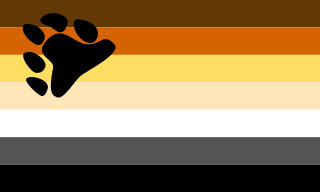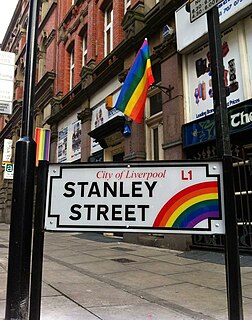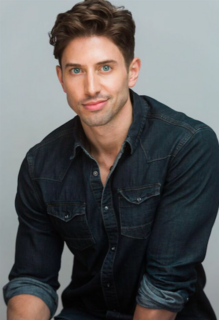
The Eurovision Song Contest is an international song competition organised annually by the European Broadcasting Union (EBU) which features participants representing primarily European countries. Each participating country submits an original song to be performed on live television and radio, transmitted to national broadcasters via the EBU's Eurovision and Euroradio networks, with competing countries then casting votes for the other countries' songs to determine a winner.

The European Broadcasting Union is an alliance of public service media organisations, established on 12 February 1950. The organisation is made up of 115 member organisations in 56 countries, and 34 associate members from a further 21 countries. It is best known for producing the Eurovision Song Contest. It also hosted debates between candidates for the European Commission presidency for the 2014 and 2019 parliamentary elections but is unrelated to the European Union itself.

Gay square dance is square dance as it is generally danced in the Gay and Lesbian community. The first gay and lesbian square dance clubs formed in the mid-to-late 1970s in the USA. There are currently about eighty gay square dance clubs worldwide.

Modern western square dance is one of two American types of square dancing, along with traditional square dance. As a dance form, modern western square dance grew out of traditional square dance in the American West. The term western square dance, for some, is synonymous with "cowboy dance" or traditional western square dance. Therefore, this article uses the term "modern western square dance" to describe the contemporary non-historical dance which grew out of the traditional dance. Modern western square dance was the official dance of the United States from 1982 to 1993.

In gay culture, a bear is a larger and often hairier man who projects an image of rugged masculinity. However, in San Francisco during the 1970s, any hairy man of whatever shape was referred to as a 'bear' until the term was appropriated by larger men, and other words had to be used to describe hairy other-shaped men such as otter (slim), cub, or wolf. The word manatee describes a big, hairless man, i.e., a bear without hair.

The leather subculture denotes practices and styles of dress organized around sexual activities that involve leather garments, such as leather jackets, vests, boots, chaps, harnesses, or other items. Wearing leather garments is one way that participants in this culture self-consciously distinguish themselves from mainstream sexual cultures. Many participants associate leather culture with BDSM practices and its many subcultures. For some, black leather clothing is an erotic fashion that expresses heightened masculinity or the appropriation of sexual power; love of motorcycles, motorcycle clubs and independence; and/or engagement in sexual kink or leather fetishism.

Vienna has been an important center of musical innovation. 18th- and 19th-century composers were drawn to the city due to the patronage of the Habsburgs, and made Vienna the European capital of classical music. Joseph Haydn, Wolfgang Amadeus Mozart, Ludwig van Beethoven, Franz Schubert and Johann Strauss II, among others, were associated with the city, with Schubert being born in Vienna. During the Baroque period, Slavic and Hungarian folk forms influenced Austrian music. Vienna's status began its rise as a cultural center in the early 16th century, and was focused around instruments including the lute.

LGBT tourism is a form of tourism marketed to gay, lesbian, bisexual, and transgender (LGBT) people. People might be open about their sexual orientation and gender identity at times, but less so in areas known for violence against LGBT people.
Alliance of Round, Traditional and Square-Dance, Inc. (ARTS-Dance) is an association to promote round, square, line, and other forms of traditional and folk dance. It is a non-profit/charitable foundation under the U.S. Internal Revenue Service section 501 (c) (3) incorporated in North Carolina in 2003 with main address in San Diego, California. It used to be known as ARTS Alliance.
Challenge square dance, also known as Challenge dancing, is modern Western square dance focused on the puzzle-solving aspects of square dancing at the most difficult or "challenging" levels.

The National Palace of Culture, located in Sofia, the capital of Bulgaria, is the largest, multifunctional conference and exhibition centre in south-eastern Europe. It was opened in 1981 in celebration of Bulgaria's 1300th anniversary.
A magic convention is a gathering of professional magicians, magical hobbyists, dealers, collectors of magical apparatus, books and ephemera, and other students of the art of magic. It provides a place for lectures of subjects related to the craft, as well as a series of sample performances of noted or innovative techniques. Many conventions also hold competitions to judge who excels at a particular style, and present awards in various categories such as sleight of hand, card tricks, mentalism, stage illusions, and International Magician of the Year. The largest magic convention is The Blackpool Magician's Convention which is attended by over 3,500 magicians.

The International Gay Rodeo Association (IGRA), founded in 1985, is the sanctioning body for gay rodeos held throughout the United States and Canada. They are the largest group coordinating rodeo events specifically welcoming lesbian, gay, bisexual, transgender (LGBT) as well as heterosexual participants and spectators. IGRA is composed of many regional gay rodeo associations, and sanctions a season of rodeo events which culminates in an annual World Gay Rodeo Finals. IGRA events are intended to allow all competitors, regardless of sexual and gender identity, to compete in rodeo sports without discrimination. The organization helps spread appreciation for Western culture and the sport of rodeo, while serving as a fundraising vehicle benefiting many charitable organizations.

The Culture of Manchester is notable artistically, architecturally, theatrically and musically. Despite being the 5th largest city in the United Kingdom by population and the second largest conurbation, Manchester has been ranked as the second city of the United Kingdom in numerous polls since the 2000s (decade), with an influential culture scene helping to elevate Manchester's importance in the national psyche. This has helped the city's population grow by 20% in the last decade, and made the universities the most popular choices for undergraduate admission.

The Stanley Street Quarter is an area within Liverpool City Centre, England, which serves as the main focal point for Liverpool's lesbian, gay, bisexual and transgender community. It is made up of mixed use developments including residential blocks, hotels, bars, nightclubs and various other businesses, many of which cater for the LGBT community. The quarter is also one of the sites where the annual Liverpool Pride is held.

Nicholas Adams is an American actor, singer, and dancer, known for starring as Adam/Felicia in the original Broadway production of Priscilla, Queen of the Desert and starring as Whizzer Brown in the first national tour of the Lincoln Center Theater revival of Falsettos.

Atlanta's mild climate and plentiful trees allow for festivals and events to take place in the city year-round. One of the city's most popular events is the Atlanta Dogwood Festival, an arts and crafts festival held in Piedmont Park each spring, when the native dogwoods are in bloom. Atlanta Streets Alive, inspired by the ciclovía in Bogotá, Colombia, closes city streets to car traffic to allow people to participate in health and community-oriented, such as bicycling, strolling, skating, people-watching, tango, yoga, hula hooping, and break dancing.
Seattle has a notably large LGBT community, and the city of Seattle has protected gay and lesbian workers since the passage of the Fair Employment Practice Ordinance in 1973. Seattle's LGBT culture has been celebrated at Gay Pride Week which began in 1977. Gay cabaret traveled in a circuit including Seattle and San Francisco since the 1930s. Seattle had gay-friendly clubs and bars since the 1930s including The Casino in Underground Seattle at Pioneer Square which allowed same-sex dancing since 1930, and upstairs from it, The Double Header, in continuous operation since 1933 or 1934 until 2015, was thought to be the oldest gay bar in the United States.

The Eurovision Song Contest has had a long-held fan base in the LGBT community, and Eurovision organisers have actively worked to include these fans in the contest since the 1990s.














